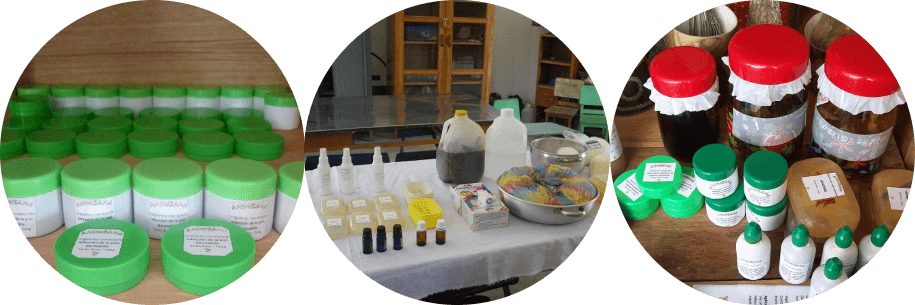
#1 Study and transformation of plants.
The Xavier TANGUILA College has been the first partner of Ishpingo. This educational structure had a considerable impact in helping the development of Ishpingo foundation, in particular by its commitment in the tree nurseries swarming project among the different communities located within the canton of Talag.
Antoine VUILLIEN, agricultural engineer and co-founder of Ishpingo, did his postgraduate internship in this institution. Students of the Xavier TANGUILA College are all coming from one of the 18 communities living in the canton of Talag. Since children are often the best specifiers, their parents quickly heard of the nursery and the countless young shoots of valuable lumber wood within it. Thus, during parent-teacher meetings, we naturally got the opportunity to introduce our reforestation project to the heads of the households.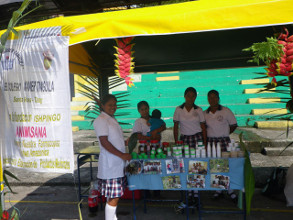 Lots of local farmers were intrigued by the agroforestry techniques used by Ishpingo. They get caught up and decided to set up their own community nurseries. During the 5 following years, the College had a key place within our project because it was the ideal education center for young generations. Since the beginning, a relationship based on mutual trust and respect bind us to the different members of this education structure (teachers, parents and students). During 3 years, every single Saturday morning we facilitated the « campo de accion » for final grade students. During these recurring events we worked within the tree nursery and the botanic garden but also in the forest, looking for plants.
Lots of local farmers were intrigued by the agroforestry techniques used by Ishpingo. They get caught up and decided to set up their own community nurseries. During the 5 following years, the College had a key place within our project because it was the ideal education center for young generations. Since the beginning, a relationship based on mutual trust and respect bind us to the different members of this education structure (teachers, parents and students). During 3 years, every single Saturday morning we facilitated the « campo de accion » for final grade students. During these recurring events we worked within the tree nursery and the botanic garden but also in the forest, looking for plants.
The Xavier TANGUILA College is specialized in chemistry and biology but due to the lack of teachers and further training the student might not always got proper courses directly related to those two specialties. Therefore the Ishpingo foundation wished to deepen its relationship with the College and decided to launch a new project as a continuation of its other activities : creating a laboratory to study and transform medicinal herbs.
#2 Genesis of the laboratory
Due to some financial, logistical and administrative issues, this laboratory project took about six months to become reality.
First we prepared the project documentation that we finally submitted to several different funders in order to collect the necessary amount of money. Meanwhile, we took the necessary steps for the teaching of a new subject within the College with the direction of bilingual education of the Napo.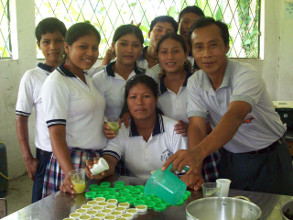 Luckily we had already met Mr Angel ALVARADO also know as « El Profesor » during our different reforestation tasks. Today we are proud to count him among our close friends. He has been working within the biological station of Jatun Sacha for 17 years, developing an outstanding knowledge in botany and pharmacognosy. It makes him the only native person able to : identify any tree or plant, know their kichwa name, vernacular name and scientific name, know how to use them for medicinal purposes and the way to associate them to enhance their curative properties. He ever told us that he has always been willing to pass on his knowledge so he accepted our proposal to join the College as a Botany professor right away.
Luckily we had already met Mr Angel ALVARADO also know as « El Profesor » during our different reforestation tasks. Today we are proud to count him among our close friends. He has been working within the biological station of Jatun Sacha for 17 years, developing an outstanding knowledge in botany and pharmacognosy. It makes him the only native person able to : identify any tree or plant, know their kichwa name, vernacular name and scientific name, know how to use them for medicinal purposes and the way to associate them to enhance their curative properties. He ever told us that he has always been willing to pass on his knowledge so he accepted our proposal to join the College as a Botany professor right away.
Since 2009, Mr ALVARADO has been handling 3 teaching hours a month with school students. He approaches in theoretical and practical terms the different ways to treat common diseases using the traditional pharmacopoeia of the rainforest. He also teaches how to brew creams, ointments, syrups and shampoo from medicinal herbs.
Meanwhile we began to cultivate, within the College and with the help of the students’ mothers, several different type of medicinal herbs.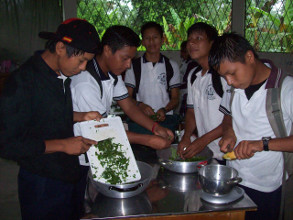 On these dedicated plots Mr ALVARADO and his students harvest the main stuff. He usually improves his gatherings either by wandering in the vicinity of the College or asking to the pupils to bring him back a specific root or bark. These natural ingredients often grow naturally on their parents plots but are still almost unknown by the young generations. Flore MOSER, co-founder, and Mr ALVARADO both took a two days course within the Florasana laboratory in Puyo in order to perfect their brewing skills to create marketable products (menthol, shampoo, syrups, etc…) as well as getting a precise idea of what kind of tools they’ll have to buy. There, they met Didier LACAZE, a french herbalist in charge of Florasana production, with whom they got a good feeling and a constructing relationship. Mr LACAZE gave us valuable guidance and recommended us some shops in Quito which sell the required tools and products necessary to set up a laboratory. It made us save an invaluable amount of time ! After that we began the practical implementation of that laboratory in Tena.
On these dedicated plots Mr ALVARADO and his students harvest the main stuff. He usually improves his gatherings either by wandering in the vicinity of the College or asking to the pupils to bring him back a specific root or bark. These natural ingredients often grow naturally on their parents plots but are still almost unknown by the young generations. Flore MOSER, co-founder, and Mr ALVARADO both took a two days course within the Florasana laboratory in Puyo in order to perfect their brewing skills to create marketable products (menthol, shampoo, syrups, etc…) as well as getting a precise idea of what kind of tools they’ll have to buy. There, they met Didier LACAZE, a french herbalist in charge of Florasana production, with whom they got a good feeling and a constructing relationship. Mr LACAZE gave us valuable guidance and recommended us some shops in Quito which sell the required tools and products necessary to set up a laboratory. It made us save an invaluable amount of time ! After that we began the practical implementation of that laboratory in Tena.
#3 Setting up the laboratory
The College made available a room for us.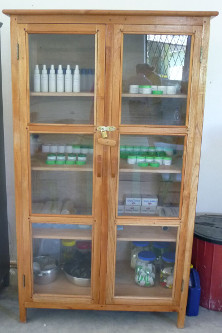 However it was really deteriorated (gaping hole in the wall, lack of door and windows, leak of water from the roof, etc…). Our priority was to refit that room before even thinking of setting up our laboratory up. From agronomist we switched to building employees.
However it was really deteriorated (gaping hole in the wall, lack of door and windows, leak of water from the roof, etc…). Our priority was to refit that room before even thinking of setting up our laboratory up. From agronomist we switched to building employees.
The next step was to find the proper tools (grinder, mixer, pans, wooden spoons, cutting boards, containers, cleaning products, gas cylinder, etc…) and to buy each kind of tool in quadruplicate in order to dispatch them among as much small student groups.
Mr. ALVARADO began the theoretical and practical lessons during the first half of October 2009. In order to get the students acquainted with this new topic, he presented some of the local plants and used them to brew infusions and decoctions. Both students and teachers received Mr. ALVARADO well as a member of the teaching staff and a colleague.
To mark the birth of the laboratory, a mutual agreement has solemnly been signed by the director of the Xavier TANGUILA College and the two leaders of Ishpingo.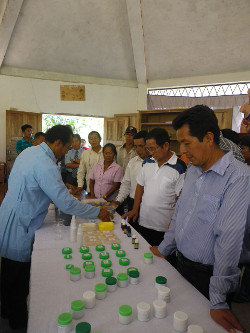 We went to Quito and paid a visit the shop recommended by Mr. LACAZE in order to buy the ingredients necessary to produce more elaborated products (beeswax, camphor, soap base, neutral Vaseline, potable alcohol, etc…) and their containers (bottles and jars).
We went to Quito and paid a visit the shop recommended by Mr. LACAZE in order to buy the ingredients necessary to produce more elaborated products (beeswax, camphor, soap base, neutral Vaseline, potable alcohol, etc…) and their containers (bottles and jars).
The production of those news products began in January 2010 which radically increased the interest of the students. At the end of each preparation they could go back home with samples. The use of those samples in the family context immediately showed the products efficiency to the extend that some communities had already asked us to provide equivalent teaching courses outside of the College.
Alternatively to the traditional pharmacopoeia, we also elaborated body treatment based on : fruits (pineapple, papaya, tomatoes), honey, powder milk and clay because these products are cheap and easy to get.
Finally, we had at our disposal a range of :
Aromatic substances obtained through alcohol maceration (flowers, fruits, roots, barks) ;
Mentholated ointments (for sprains, fever, sinusitis, muscle pains, insect bites, wounds or skin infections) ;
Facial and body care (masks and scrub) ;
Soap (ginger, lemon-grass and cinnamon) and after-shampoo.
Other products such as creams are currently being studied, tested or developed.
In February 2010 we presented our products during an event called EXPOFERIA and organized by th Regional Council. In order to design and print the product labels we had to find a brand name. Mr. Angel ALVARADO suggested ANIMISANA (from animi which means tree and sana which means treat). Our stand was a success and we managed to seal our first sales. But more important, the students who helped us to run the stand felt proud to present the fruit of their work and realized how interested were the urban populations in these products. Since that day the students have been fighting each other’s to get a chance to be present on our stand!
After that we have extended this traditional medicine project to the community of Venecia. They asked our help to provide them teaching courses in order to be able to brew and sell balms by themselves. This transfer of knowledge was successful since this community still produces and uses herbal medicine today.
